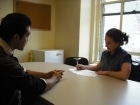By Mike Dang
For many college students, getting the first big job interview can be extremely nerve-wracking. Excitement for the opportunity mixes with the fear of messing up what could potentially be something that can launch a career. To help you avoid a professional faux pas right off the bat, we’ve put together some practical (if sometimes unconventional) advice on how to make sure you’ll be a candidate interviewers can’t resist.
Before the interview
Do your research
If the organization you’re interviewing with has a Web site, check it out. Look at every single link and get to know the organization’s history, greatest achievements, and key players. You may discover that the position you applied for is something other than you had in mind and that you don’t want to work there at all. You can also do a news search (as Batt did), to have things to talk about during your interview. Doing research will allow you to ask informed questions and show you care about the position.
Get organized
Print out extra copies of your resume and make sure your portfolio is organized with your best work in the front. If your interviewer looks at a weak piece of work right off the bat, they’re likely to focus on that for the remainder of the interview.
Get your outfit together
Here’s the rule of thumb: Always dress for your position’s industry. If you’re not sure, go with professional dress with neutral colors. This means if you’re applying for a position with a fashion magazine, you need to know what the trends are and dress appropriately. If you’re applying with a financial company, invest in a good, tailored suit that fits you well. Avoid wearing your parents’ business clothes from the earlier decades – this is not the time for velvet and corduroy. Your belt should match your shoes. Don’t wear something you’d wear on casual Friday. If you run out of dark socks, don’t color in your ankles with a black marker (people have done this!). Oh, and don’t smell like anything. Don’t put on a strong perfume or deodorant and please put on clean clothes.
Know where you’re going
And know how long it takes to get there. There have been many people who ruined a perfectly good chance by simply getting lost on the way to the interview. To stay on the safe side, it might be a good idea to do a practice run.
During the interview
Be confident
Here’s the thing: Employers are usually flooded with resumes from applicants hoping to score an interview, and guess what? You scored an interview! Clearly, somebody already sees some potential in you. Here’s your chance to prove them right.
Get comfortable
If you’re uncomfortable with the interview setting, your interviewer will know. If the setting is a fast-paced office environment, don’t look lost, look alert. Get comfortable, but don’t get too comfortable. Don’t get sloppy or take off your shoes.
Don’t make lame jokes
Everyone loves a person with a great sense of humor but hates someone who tells really bad jokes. Telling jokes during an interview is entering into dangerous territory. You never know what may be offensive to an interviewer.
Don’t ask your interviewer out on a date
This actually happens a lot more than you think. Just don’t do it.
Honesty is usually the best policy
There are things you should always be completely honest about: your past salary history, the amount of experience you have listed on your resume, your education, etc. Yet there are other things you should probably keep to yourself. If your interviewer asks you if you’re a team player, don’t say yes and then go on to explain how much of a positive influence you were on your basketball team in prison.
Know what you want
If you don’t have an answer to how you feel this position will help you in achieving your career goals, you’ve got a huge problem. Know where you want to be in five years, or at least have some ideas of where you want to be. And under no circumstances should you tell the interviewer, “I don’t know where I’ll be, but I know it’s not here.”
Don’t contradict yourself
Don’t show up a few minutes late and then say that you pride yourself on being punctual. Don’t say you’re a creative thinker who works outside the box and then provide examples of how you always follow directions to a T. Have three examples to support whatever you say. If you suddenly find yourself in a contradiction, back up. Let the interviewer know you contradicted yourself but say that you wanted to show how flexible you are.
Don’t be mean
It’s a double standard, but if your interviewer makes a mean comment about the company or current employees, smile politely. Don’t say something equally mean thinking you’ll get brownie points. If you hated your previous job, co-workers, or boss, refrain from talking smack about them. Leave your rants at home. Your interviewer is not your mom or best friend. I hope.
After the interview
Provide a thank you note
Sending a short note thanking your interviewer for their time and reinstating your interest in the position is a good idea because it sets you apart from those that don’t. If your interviewer hasn’t told you whether or not you have the position by the day you discussed, follow-up again with a nice e-mail. Keep some distance afterwards and don’t become obsessive. No one likes a stalker.
By now, you should be a complete interview pro. Don’t be too disappointed if you don’t get the position after a great interview. There’ll be many more down the road and before you know it, you’ll have the position you were always meant to have.

